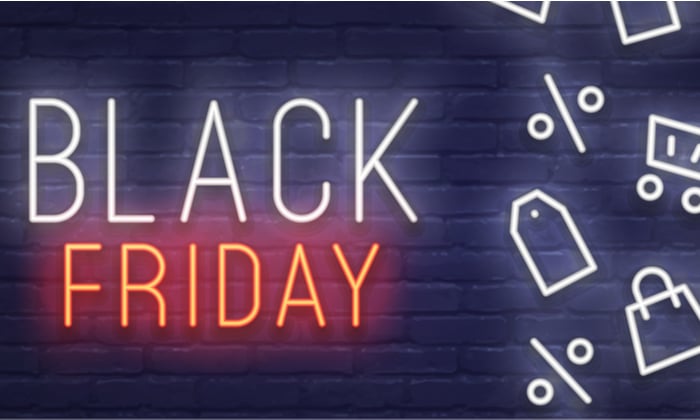
30 percent of all retail sales occur between Black Friday and Christmas. This means preparing your e-commerce site for this busy period is essential to success. The good news is, small changes can make a big difference to your revenue. The level of competition for Black Friday e-commerce sales is off the charts, which means it pays to start preparing now.
Here’s your 15-step checklist to get your e-commerce site ready for Black Friday and holiday shopping.
1. Start Planning Early
Time moves quickly! You take a few weeks to recover from a busy summer season, and all of a sudden, Black Friday is upon you.
Exceptional digital marketing brings together lots of different elements, and it takes time to do this. When it comes to the big holidays, you want everything to be running perfectly, so you’ve got to start planning ahead of time.
Shoppers start planning their holiday shopping ahead of time, and as a seller, you should be there to help them meet their needs. Get your site ready in advance: plan your advertising, decide what deals you’ll offer, and make sure your site works seamlessly.
2. Create Comparison Guides and Other Content
Good content plays a part in every step of your buyer journey.
Shareable, quality content expands your reach. People find it on social media and in search engines, and it draws them in to read more.
Once you’ve got your audience hooked, then you can give them valuable information that establishes your authority, and helps them to come to a purchasing decision. This builds a relationship and gives people the confidence to complete their purchase.
If you’re going to follow this step, make sure to focus on quality. Create content that offers real value (rather than something that’s just for show). It will take more time and effort, but it will greatly improve the impact.
For example, if you’re writing a piece on the Best Hot Tubs for the Winter Season, don’t just write a short 250-word article on the product you want to sell. Provide people with an in-depth comparison guide that helps them make an informed decision. (There’s nothing stopping you from making the one you want to sell sound extra great.)
3. Organize Your Featured Sales
We all love a good sale. For many people, featured sales are the reason to go shopping on Black Friday and Cyber Monday, turning these days into bonanzas for retailers.
However, when just about every site has a sale, it’s hard to make your stand out.
Sales promotions aren’t just about savings. They’re also about embracing the excitement of the holidays, building a buzz about your brand, and strategically selling your stock. The right sales should balance your business goals with your customers’ wants and needs.
Think about your featured sales from a marketing point of view. How can you grab people’s attention, and drive them through your buyer journey? If your featured sales can do this, then they’re going to have a big impact on your revenue.
Keep in mind, this might include using loss leaders to drive traffic to your store.
4. Test and Optimize for Site Speed
When you see people lining up in the morning to be the first people in the store on Black Friday, you get the impression they’re in a rush. There’s no reason to believe things are any different for your Black Friday e-commerce shoppers.
Black Friday and holiday shopping are all about capitalizing on excitement, and a slow website is the enemy of excitement.
Check your website’s speed now so you have time to make the required changes. A quick way to do this is by running your website through Google Lighthouse or Google PageSpeed Insights.
These provide actionable steps you can take to improve your site speed. Here are a few more tips to increase your page speed.
5. Update Your Website’s Visuals and Copy
There’s a reason why (virtually) every ad you see during the holidays plays on the festive theme.
It’s an easy opportunity to be relevant and show you care about the same things everyone else cares about. The holidays are happy times; people are excited about Thanksgiving, excited about the holiday sales, and eager for Christmas.
Show that you’re excited too.
Don’t just put a token discount on your site; embrace the holidays, and make sure your website’s visuals and copy reflect people’s excitement.
eBay keeps it simple with a banner, but you can also update hero images and product images to highlight the holiday spirit.
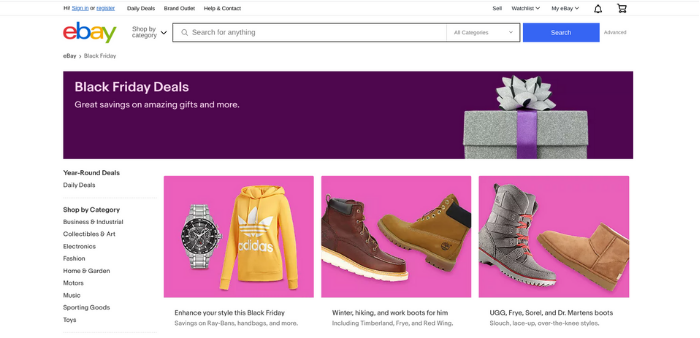
You don’t need to go overboard, but images and copy that are in keeping with the period will make a difference.
6. Leverage Social Media Platforms
Social media is a great way to communicate with your target audience (whether that’s through organic posts or paid ads). When the holidays come around, your ability to reach your target audience becomes even more important.
If you’re going to bring your holiday cheer and amazing deals to people, you need to reach your audience.
You’ve already invested in high-quality content by following step two, so now you have a great way to engage with your followers and target audience.
Best Buy does this by sharing content like gift guides:
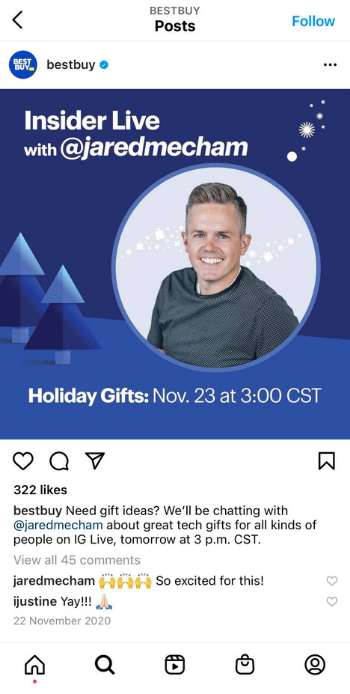
Everyone is paying for ads this time of the year, which means your cost per click can be much higher than normal. If you’ve got amazing content you can craft your ads around, you’re going to lower your costs and drive up conversions.
7. Review and Improve Product Pages
Sales don’t happen by accident. Even if you’re offering an unbelievable deal, buyers still go through a complicated decision process before committing to buy.
Every interaction potential customers have with your brand goes into their purchasing decision. If there are certain parts that aren’t up to standard, then it’s going to cause them to question their decision.
One of your key assets in Black Friday e-commerce is your product page. People can’t feel your products in their hands and see them with their own eyes, so they’re reliant on your product page.
Don’t focus on stuffing features into your product pages. Instead, focus on benefits and use them to tell a story. Use high-quality multimedia, and give people all the information they need to make a decision.
8. Create Gift Idea Guides
Much of the holiday is about gift-giving. Some people love thinking up ideas and crafting elaborate plans to surprise loved ones. For others, thinking up gift ideas is difficult and a little bit stressful.
Gift ideas work well for Black Friday e-commerce because it’s a time when people start thinking about Christmas present ideas.
A quick look at Google Trends shows that searches for gift guides increases dramatically in early December:
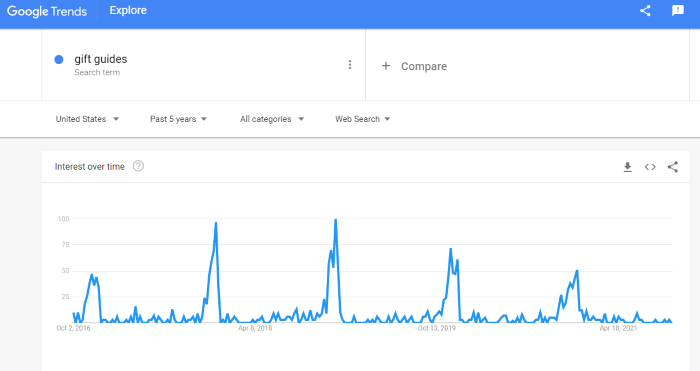
This is another opportunity to create engaging, helpful content that speaks to your target audience. Dig down into your ideal customers and use your expert knowledge to help them find the perfect gift for their loved ones.
9. Segment Your Emails for Personalized Offers
Email marketing is one of the most effective digital marketing strategies out there.
This is particularly true during holiday shopping, with 75 percent of people search through their inbox for relevant discounts. Adidas leverages this interest by sending out discount emails like this one:
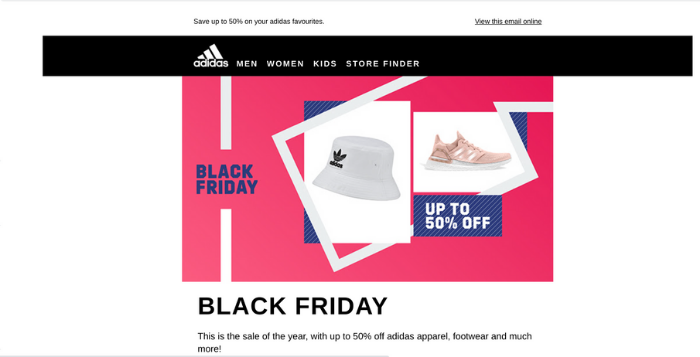
As I mentioned earlier though, Black Friday e-commerce is about more than discounts; it’s about engagement. If you’re going to get your discounts in front of the right people, you first need to build a relationship with your target audience.
The best way to do this is by segmenting your email list to deliver personalized content. For example, if you sell sports apparel and equipment, you might segment people into “shopping for apparel” and “shopping for equipment” based on the page they signed up from.
You might also segment based on current customers and new list members, those interested in beauty products versus bath items, and so forth.
This allows you to send more personalized content that engages your audience, and importantly, helps you get the right offers to the right people.
10. Improve Your Return Policy
A good return policy is essential for e-commerce sales. When people go to a physical store, they get to try things on and see and feel products in the flesh. We don’t have that ability in e-commerce (although AR and other technologies are a step in the right direction).
When people are making a buying decision, a good return policy can tip the scales in your favor. It means buyers can “take a chance on your product” knowing they can easily return it if it’s not what they’re looking for.
Don’t just update your return policy, though. Make sure you use it to sell your products. Highlight that you offer hassle-free, pre-paid returns and use it to influence the buyer’s decision.
Consider offering an extended return policy during the holiday season so gift recipients can return gifts if they aren’t the perfect fit.
11. Have a Backup Plan
There are many different ways to reach and engage your target audience.
In the clamor of businesses trying to reach their customers, things can change quickly in marketing. You may have planned your ads with a CPC of $1.00 in mind, only to see the costs shoot up amidst the competition.
This is where you have to be flexible and make use of your entire digital marketing armory.
For example, if your paid ads are more expensive than you planned, or aren’t bringing in the desired return, then it’s good to have a strong email marketing campaign to fall back on.
The more planning and preparation you do, the more opportunities you have to pivot your tactics.
12. Follow up on Abandoned Carts
Abandoned carts are frustrating. If you could convert even half of those people, it would significantly increase your sales.
People leave items in their cart for a reason. Perhaps they use it as a wishlist, they were frustrated by your checkout, or they just weren’t convinced by your offer. Maybe they meant to buy and just forgot.
If you have their email address, you have an opportunity to change the equation and recover those abandoned carts. The best part is, it can all be automated.
You have an opportunity to address people’s concerns, so take it. Offer them that extra discount, ask if they need help, or just send a gentle reminder.
13. Prepare Your Customer Service
More traffic and more sales come with more customer service requests. Just because people are shopping online doesn’t mean they don’t have questions.
To meet this increase in demand, your customer service has to be prepared.
Make sure you’re using the right tools, such as live chats, and that you have enough staff to handle the volume of requests. Answering people’s simple questions can be all it takes to turn an abandoned cart into a sale, so it’s well worth investing in this area.
Consider adding a chatbot to your site, so you can automate some of these processes. Remember that the human touch can make all the difference.
14. Use Retargeting to Boost Brand Awareness
Not everyone who comes to your site is going to make a purchase.
Black Friday e-commerce is an opportunity to build brand awareness and sow the seeds for future sales. Every person who comes to your website is an opportunity, even if they leave buying anything.
Use retargeting to engage your website visitors and bring them back.
Consumers are 70 percent more likely to convert with retargeting and conversion rates can increase by 150 percent.
Black Friday and the holiday shopping period is a great time to get people into your retargeting funnel.
15. Optimize Your Checkout Processes
When your checkout process is clunky, and continually puts barriers between your customer and their purchase, their patience wears thin. You’ve done all the hard work to build excitement and get people to commit to making a purchase, now you’ve got to make it simple for them to finish their purchase.
Go through your checkout process and ask yourself if it can be made easier. If the answer is yes, then make changes. Don’t let a broken or complicated check-out process lose sales.
Frequently Asked Questions About Black Friday E-Commerce Marketing
What is e-commerce Black Friday?
What is Black Friday marketing strategy?
A Black Friday marketing strategy helps retailers prepare for the busy sales period and maximize revenue.
How do I prepare for Black Friday e-commerce sales?
When should you start marketing for Black Friday?
Black Friday Checklist Conclusion
Black Friday and holiday shopping are crucial for e-commerce websites, so it pays to start preparing early.
Get everything in order, and then embrace the season by focusing on the steps above.
Remember that Black Friday e-commerce is about more than just deals and focus on how you can offer value to your target audience. With great outreach, engaging content, personalized offers, and a slick sales funnel, you’ll have an excellent chance of maximizing your sales.
Are you ready for Black Friday?
from Blog – Neil Patel https://ift.tt/3uEv2kO

No comments:
Post a Comment